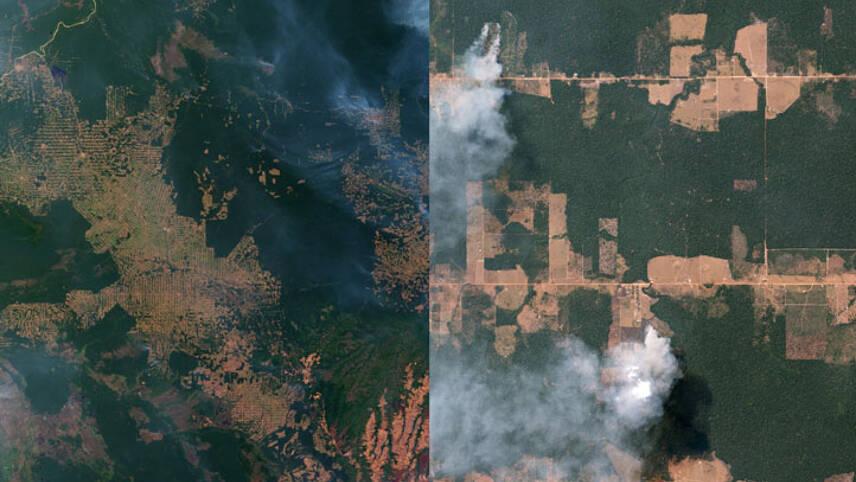Register for free and continue reading
Join our growing army of changemakers and get unlimited access to our premium content

Fires and deforestation on the Amazon Frontier, Rondonia Brazil - August 12, 2007 (left), August 4, 2016 (right).
For protectors of the Brazilian Amazon, satellite imagery is enabling an unprecedented response to environmental crimes and other illicit activities, such as illegal deforestation, bushfires, mining, use of illicit airstrips/runways, drug trafficking, smuggling, slave labor, and more.
The deforestation of the Amazon is not just a threat to the world’s largest rainforest, one-fifth of the world’s land species, or the 30 million people who live there, including hundreds of indigenous groups and several dozen isolated or uncontacted tribes. The destruction of the Amazon is a threat to one of the world’s largest carbon sinks (NASA Earth Observatory), and globally, the struggle to track deforestation and hold perpetrators accountable has long been an uphill battle.
The size and complexity of the Brazilian territory, especially in the Amazon region, has historically plagued institutions, like the country’s Federal Police, with challenges around effective response to environmental crimes and illicit activities. Now, the institutions are using daily medium- and high-resolution satellite data to monitor, investigate, and prevent illicit activities in one of the most remote regions of the world.
Planet is a leading provider of global, daily satellite imagery driven by a mission to image all of Earth’s landmass every day, and make global change visible, accessible and actionable.
Using daily medium- and high-resolution images from Planet, the Federal Police of Brazil receives change detection alerts that pinpoint where changes, such as unpermitted roads or airstrips, are being constructed. This means that the government can actually act to stop illegal mining or logging before it occurs, as opposed to trying to catch perpetrators after the damage has been done, and the forest is gone.
This program presents a model for how governments–with over 100 countries committed to halting deforestation in their respective territories by 2030 (BBC)–can monitor and protect forests that would otherwise be extremely difficult to manage. This level of transparency is one major, critical step towards protecting our forests around the world.
To learn more about how the Brazil Federal Police had a nearly $2bn impact on organised crime and illicit activity in the Amazon, read the Case Study here.



Please login or Register to leave a comment.